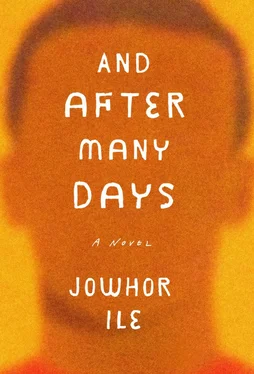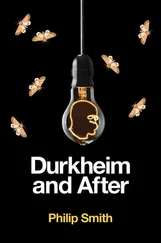She rode back to Ogibah with Ireju, thinking of Bendic in a darkened cell, being tortured to give some information he didn’t have. When she thought of the people she had heard being killed on suspicion of being saboteurs, her heart sank to her stomach, but she told herself that Bendic would not be taken from her permanently.
Two months later, the same wicked man who had reported Bendic to the authorities, this man whose name Ma refused to mention to her children, returned, as he claimed, from “headquarters” and reported that he had seen Bendic being executed. He claimed he had been standing right there when they put a rifle to Bendic’s head and blew it away. Neighbors gathered around Ma’s locked door as she screamed in her room and banged on the wall.
Bendic’s mother didn’t weep or blame anyone for her son’s death — not the Ogibah man who made the false report, not the soldiers, nor the war. She spoke quietly of her own folly. Her regret was simple: She should have made the soldiers take her along when they came to arrest Bendic, or provoked them to shoot her and her son right there. Instead, what had she done? She had begged them like the wretched woman she was. She had sworn to them that her son had done nothing wrong; she had pleaded with them to sit down to eat, to put something in their stomachs for the long journey they had ahead. Hadn’t they traveled far to get here? She told them she was Biafran, not Nigerian; she spoke the little Igbo she knew, but it did not do. They ate her food and carried her son away. Now that they had murdered him, was her suffering not far worse than death?
Four days later, when she did not get up in the morning, everyone knew she couldn’t really have been expected to survive such a blow.
The war came to an end the following month, and Ma ambled about the house like a dark hen. A not so young widow with an old father-in-law and no children to speak of. Weeks passed, and then one day she got word from an old friend in Port Harcourt that detainees had been released and people were finding relatives they had thought were executed. The government had dumped them at the Municipal Primary School in Diobu, announcing over the radio for people to go claim their relatives. Ma made her way to Port Harcourt that same afternoon. She said her spirit told her that Bendic was among them. That he was alive.
“Nobody there looked like Ben,” she told her children. As she had turned to leave the school grounds, covered with sick, dying men, she heard the whisper from a body lying on the ground next to her feet, a quiet voice saying her name. She looked at the shrunken body. The gaunt skull looked too heavy for his neck to carry. She looked in his eyes and knew it was him. She carried him on her lap, weeping all the way as the taxi took them home.
—
Eight years after the war, the children’s grandfather passed away. He was aged eighty-one and died of natural causes, as they say. Something happened to Bendic right after, and he became a Christian. Their grandfather died in January, Ma got pregnant in February, Bendic got baptized in May, and Paul was born in November.
Ajie remembered this story one day and then sat in his room feeling sad for Bendic because he was an orphan. Ajie had always known his grandparents were dead, but it never occurred to him to think of it in those terms regarding Bendic. Things were going well between him and Bibi, so he confided in her.
“Don’t be foolish,” Bibi said, laughing, “grown-ups can’t be orphans.”
“Says who?”
“Says me.”
“If Ma and Bendic have an accident now, God forbid, and die,” she further explained, “we can become orphans. They’ll probably take you to a motherless babies’ home. Me and Paul to a remand home, I think. That’s where they normally take the youths, because we are more difficult to handle.”
Ajie looked away and scratched his chin.
They took the matter to Paul, who, after listening to Bibi’s detailed explanation, took out a heavy Oxford Advanced Learner’s Dictionary and read aloud to them. “ ‘Orphan,’ ” Paul began, “ ‘noun. A child whose parents are dead. Verb (be orphaned) (of a child); be made an orphan.’ ” Paul put away the dictionary. “And Bibi, stop wondering about the death of your parents. It can bring bad luck.”
“I don’t believe in bad luck,” Bibi said, squinting, “and anyway, it wasn’t me who started it.”
Ajie had walked away. That night, in defiance of Bibi’s correctness, he wrote in his notebook: “Bendic is an orphan. He was orphaned in 1978.”
Baptized and renewed by immersion in the murky waters of Idu waterside. The white-robed choir lifted their voices on high, stamping their feet on the muddy bank; their harmonies carried across the swamps. It was a really big thing. Ma said they had spent the whole of the previous day cooking, making preparations to entertain guests. If people threw big parties when they bought secondhand cars, how much more for when they were being accepted into the Beloved, into heaven’s gates?
Ma gave birth to a boy six months later, and they named him Paul. By the time Bibi was born, Bendic had returned to his cool regard of religion, neither approving nor objecting, cherry-picking things he fancied in any faith. When Bibi asked him one day why he didn’t pray before eating, as Ma made everyone else do, he said, “But I’m always praying, Bibi, especially when I’m asleep.” Bendic’s attitude had never stopped Ma from doing his before-food prayers for him. Whether they were eating from the same plate or if Bendic was eating alone, Ma would let her palm hover over the dish and shut her eyes, mumbling a quick “Thank you Lord for this meal. Bless, sanctify, and replenish the source.” Bendic would say, “Amen,” then wash his hands in the side bowl.
When the Jehovah’s Witnesses knocked on their gate on weekends, Bendic allowed them to sit with him for an hour or more, much to Ma’s disapproval. Ma said the Jehovah’s Witness people twisted Scriptures. Did they not say Jesus Christ was only an angel and was not the Son of God or God incarnate, as true Christians believed? Bendic said he didn’t see the harm in having a nice chat sometimes. There were times he refuted some of their doctrines and arguments because, as he told his children after the Jehovah’s Witnesses were gone, “teachings like that can only have a negative effect on people. And people are what matter, not any religion or idea.”
When the family traveled to Ogibah and the attendants from the Ntite shrine came around to greet Bendic in their long black skirts and eyes charged red from home-brewed gin, Bendic would answer loudly as they called him by his praise names. He would ask for them to be entertained. Ma said it was unnecessary to bring those kinds of people so close, “you can help them from afar.” And Bendic replied, “Just because they believe in a different fairy tale from you doesn’t make them evil.”
“Benedict!” Ma made an angry face. “What I believe in is not a fairy tale.”
Ma sometimes called him a fallen saint, a lapsed Christian, a backslider, but then she would counter herself almost immediately by saying to the children that their father was truly a Christian at heart and that was where it really mattered.
There were also times when she would jokingly tell him it was Ntite, the spirit of his family shrine, that was preventing him from being a serious Christian. “What is that other name they call Ntite? He ajabe okwu. If Ntite only resides in the dark, it’s only natural that he would want to cast some of his shadows on the lighted path before you.”
“Rubbish talk,” Bendic would say.
“It’s the truth.”
Ajie liked it when they argued like this, when there was a tinge of irritation in Bendic’s voice and a cruel ring of laughter in Ma’s. Ajie had no interest in siding with losers, so he would set himself in the center of their argument, ready to join Bendic’s camp if he was trumping Ma; if Ma began to show signs of victory, Ajie would defect to her camp. It did not really matter to him, at least not yet.
Читать дальше












